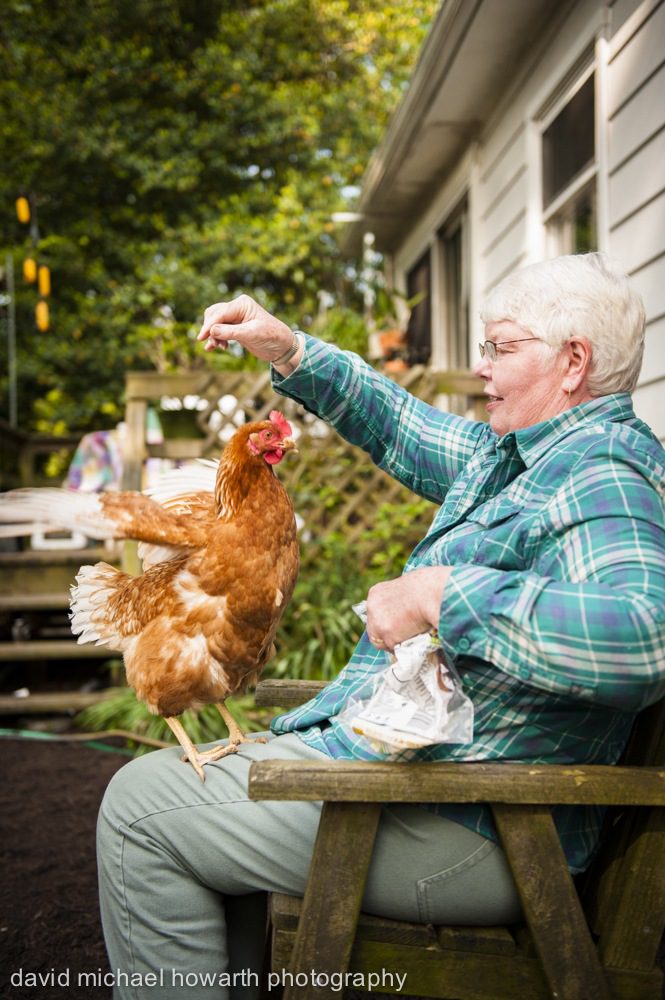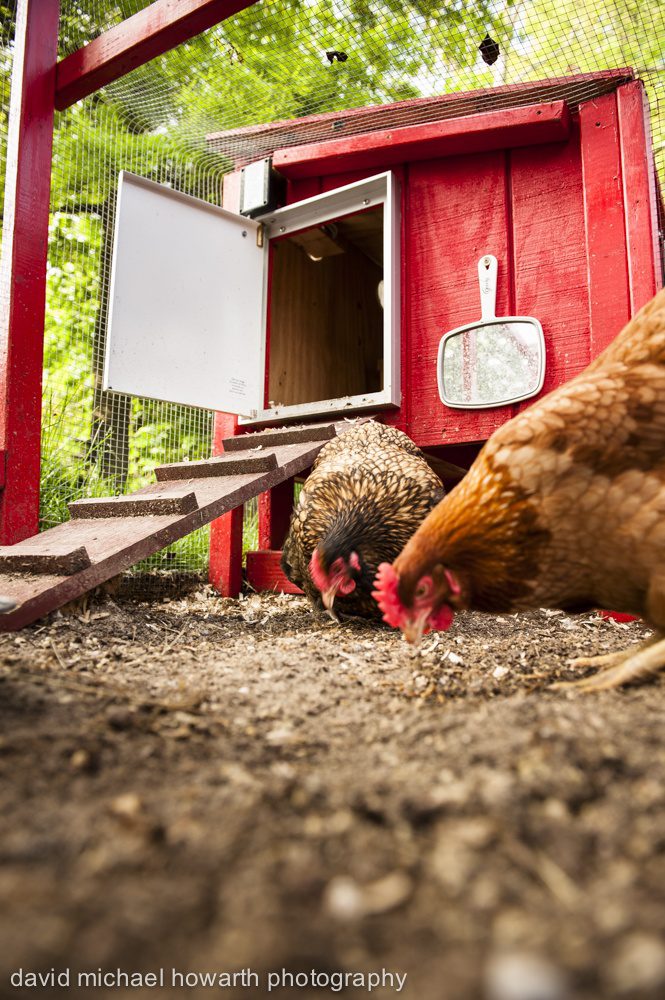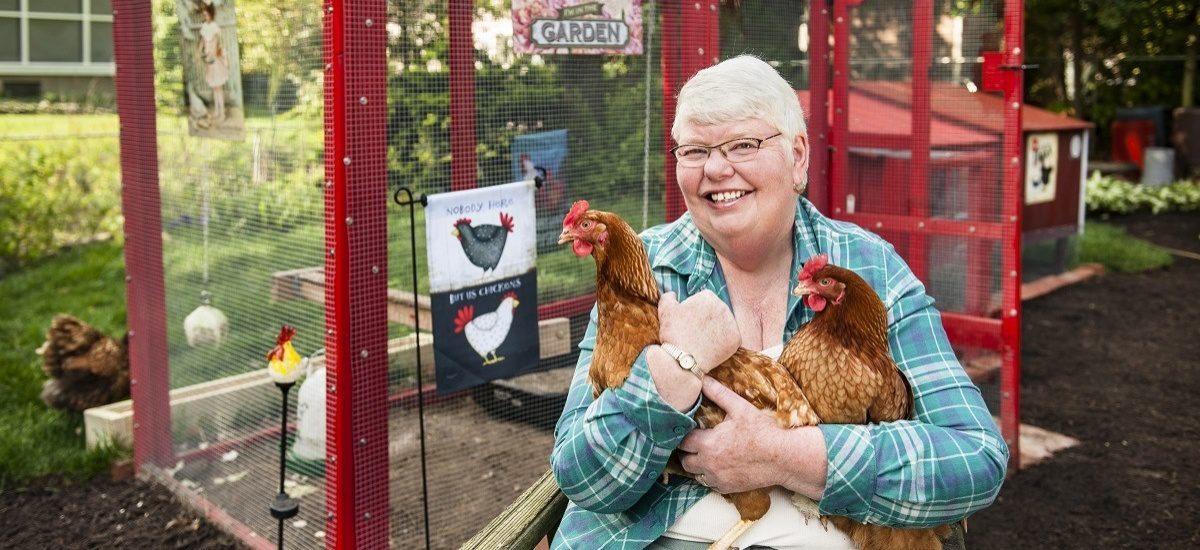Photography by David Michael Howarth
SJ Folks are returning to their roots (in more ways than one), as they transform their backyards into mini farms to better feed their families. These resourceful providers know there’s no need to buy organic when you grow your own – right outside the back door.
For a growing number of South Jersey families, breakfast begins with a trip to the backyard.
 A burgeoning desire for self-sufficiency – and growing grocery bills – have led some SJ residents to find ways to make their lawns more productive. For many, that means replacing the hydrangeas with tomato plants. For others, it means erecting a chicken coop.
A burgeoning desire for self-sufficiency – and growing grocery bills – have led some SJ residents to find ways to make their lawns more productive. For many, that means replacing the hydrangeas with tomato plants. For others, it means erecting a chicken coop.
For much of 2016, nearly two dozen Haddon Township families have been participating in the municipality’s backyard chicken pilot program. The pilot, conceived and spearheaded by master gardener Gwenne Baile, will test the feasibility of an ordinance allowing residents in the densely populated town to keep up to four hens, provided they obtain a license.
Baile spent years working to get the pilot program approved, doing research, preparing studies, gathering supporters’ signatures and presenting the plan to the town commissioners and the Planning and Zoning Board. Her work garnered local news coverage and earned her the monikers “Mamma Chicken” and “The Rebel Chicken Lady of Westmont.”
“I want to know where my food comes from,” Baile says. “I want to know what’s in my eggs, and I got tired of paying $7.50 a dozen for pastured, organic, free-range, non-GMO eggs. I’m really committed to the whole organic thing.”
Baile went back and forth with Haddon Township on the plan, which was initially rejected by the Planning and Zoning Board, eventually working out a compromise that established the yearlong pilot and its advisory board – the Chicken Commission – which educates participants, certifies families’ compliance with the rules of the pilot and investigates any complaints received by the township. Baile heads up the eight-member commission.
“The pilot really represents a compromise and a lot of patience and perseverance,” Baile says. “One thing I didn’t want was for it to be policed by a lone township enforcer. I think it would be difficult for someone to enforce the pilot if they didn’t know anything about chickens.”
The pilot’s rules include a four-hen cap, a strict ban on roosters and specifications about backyard coops and owner responsibilities. The coop must be clean, safe for the chickens and located no fewer than 20 feet from the nearest house.
“We want to be very cognizant of our neighbors and very cognizant of what’s best for our chickens,” Baile says. “We make the coops as attractive as possible and entirely predator-proof.”
Each participant was required to attend a two-hour class on chicken ownership prior to receiving their pilot license. Baile also visited each home, giving advice about coop placement.
“The class is called ‘The Basics of Backyard Chickens in the Suburbs and City,’” Baile says. “I insisted they take the class so we could be sure they knew what they were doing. Ultimately we want the pilot to have every opportunity for success.”
 While some families in the pilot see their chickens as a simple source of protein, Baile’s hens Iris, Marigold, Rosebud and Haddy (named for Haddon Township) are beloved pets.
While some families in the pilot see their chickens as a simple source of protein, Baile’s hens Iris, Marigold, Rosebud and Haddy (named for Haddon Township) are beloved pets.
“I will never eat chicken again, because I have too much of a connection with these chickens now,” she says. “I love them to death. They’re so much fun, and every day with them is a learning experience.”
Other towns have followed Haddon Township’s lead when it comes to backyard chickens. Woodbury recently introduced a pilot program based largely on Baile’s. The inquiries she receives from towns all over South Jersey prompted Baile to form Camden County Chickens, a networking group that meets regularly to discuss local ordinances and ongoing pilots.
“I do think it’s a movement,” Baile says. “Just like we have the local food movement and the environmental justice movement. This is the backyard chicken movement.”
Sarah Kirby, whose family ran the recently shuttered Kirby Brothers Feed Company for generations, has a great deal of experience with chickens, including the ones living in her downtown Medford backyard.
“When people at the store would ask us about chickens, I would always say they’re easier to keep than goldfish,” Kirby says. “Traditionally, in this country and in other parts of the world, no matter where you live or what you do, you have a few chickens around. They require hardly any care; they drink minimal amounts of water, they eat bugs and pests out of your yard, their waste is a fertilizer, and you always have a cheap source of protein. I have always felt that as far as our responsibility to the local food supply, being sustainable and self-sufficient, chickens are a no-brainer.”
Kirby sees what Baile calls a “movement” as a return to the way things were done in simpler times.
“It used to be the most normal thing in the world,” she says.
“You buy a house, you get a lawnmower, you get a couple chickens. If you had a little bit of land, of course you had chickens on it. The developments have really sprung up around here in the last couple of decades, and people got away from that. Then they raised their kids in this bubble, where they’re not around backyard chickens, and it starts to seem very novel. So now it seems new and trendy. It’s an unusual pet, a conversation piece.”
Kirby’s home certainly sparks conversation. Right in the heart of densely developed downtown Medford, she has turned a little less than an acre of backyard into a functioning “micro-farm.”
“If you were to come down our driveway, you would never suspect anything is happening in the backyard,” she says. “When you drive past our house it looks like every other home in Medford – a nice yard, a couple of cars, a bike or two. But then you walk into our backyard, and it’s like nothing you’d expect to see around here.”
The Kirbys’ micro-farm features plots of fruits and vegetables, a number of chickens and three other residents: Dot, Hope and Molly − American Lamancha goats.
“We wanted a way to have our own milk, because organic milk is expensive,” says Kirby, 33. “It made sense to expand to goats, because they’re much smaller than cows.”
Unlike hens, which lay an egg nearly every day on their own, goats must be bred in order to produce milk. Kirby says the kids produced by her goats are rehomed, purchased by other people who wish to keep them as pets.
“Obviously we can’t have a lot of goats, because we’re keeping them in our backyard,” she says. “So while Dot, Hope and Molly are forever our pets – they will always share our home – their offspring become a source of income for us.”
Kirby thinks the resurgence in backyard farming is, at least partially, the result of increased awareness about ethical and organic food practices. She cautions, though, that buying “organic” isn’t always the most responsible thing to do.
“People have started to become very aware of their food and where it’s coming from,” she says. “The other awareness is the ethics of it. If you go to the store and buy eggs that say ‘cage free,’ all that means is the chickens were shoved in a warehouse instead. They’re not in a cage, but that doesn’t mean they ever see the light of day.”
“To me, local trumps organic,” Kirby continues. “Organic loses its value if you’re buying something that was produced in California and shipped across the country, and you drive your car to the store, buy it and bring it home. That doesn’t have as much value to me as driving down the road to a local farm. I’d like to think we’re circling back around to the old way of doing things, the old way of supporting yourself and buying what you need locally.”
Kirby encourages her suburban neighbors to be aware of their property’s value. While a backyard goat herd may not be for everyone, even a small patch of pollinator-attracting flowers, she says, can benefit the agriculture of an entire community.
“When you think about resources, it becomes absurd when you see people who have acres and acres of grass they pay someone to mow every week,” she says. “You could take a small slice of that and have it produce something that would add value to your own life or value to your neighborhood. I think that’s something people need to be thinking about. Other people choose to have grass. We choose to have vegetables and chickens and goats, and we’re trying to show that you can do this, even in the suburbs, and still be normal.”















Great article. Glad this program was passed in Haddon Township.